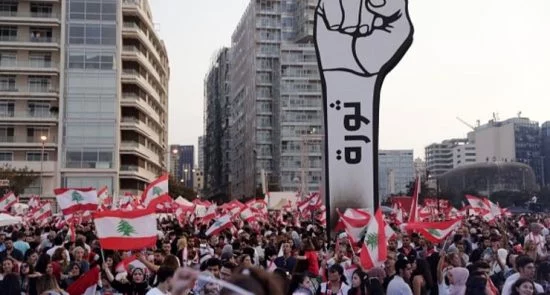Asia October 28, 2019
Short Link:Lebanon’s government needs to show a ‘resolve for the state to function’
Lebanon’s leaders need to win back the confidence of its citizenry not by announcing reforms, but by actually implementing them properly, the International Monetary Fund’s director for the Middle East and Central Asia said.
Ariana News Agency-
“People are suffering because of the low level of growth, the fact that there is low employment,” Jihad Azour told CNBC’s Hadley Gamble in Dubai ahead of the Fund’s release of its quarterly regional outlook.
The economist’s advice comes amid the country’s largest protests in 14 years. Azour, who previously served as Lebanon’s minister of finance from 2005 to 2008, said that if the government dedicates itself to executing functional governance, that translates into better services and job creation. Unemployment in Lebanon currently hovers between 35% and 40%.
“Therefore, I think it’s very important now to stabilize the financial situation by addressing the fiscal imbalances, by providing clear direction of reforms that addresses some of the long lasting issues, the structural problems, and also to show that there is a resolve to have the state function to service the needs and aspirations of the people in the street.”
Lebanon’s banks remain closed eleven days into the mostly peaceful protests, sparking fears of a rush on the banks and a depletion of the country’s dollar reserves once they do finally reopen.
To address this fear, Lebanon has put a temporary ban on taking large amounts of dollar cash out of the country. Many blame Lebanon’s dangerously low foreign currency levels on the policies of its central bank governor Riad Salameh.
Lebanon’s central bank, the Banque du Liban, has been intervening for years to prop up the Lebanese pound by selling dollars and buying pounds.
But in order to sell dollars, it has to buy the dollars in the first place — meaning that as economic problems have worsened, the dollar reserves have been worn down. Lebanon’s commercial banks have to buy dollars from the central bank, and those dollars are locked in the central bank’s reserves or in Treasury bills.
Asked if popular anger at the central bank is warranted, Azour replied, “It’s not for me to answer this question.” But he stressed the urgency of the Mediterranean country’s financial situation, something he said the IMF is “observing closely.”
“Lebanon has been suffering for a long period of twin deficits, budget deficit and current account deficit, with the backdrop of a very low level of growth that was not able to create enough jobs,” Azour said. “Therefore, what is needed today is a very strong and convincing reform package that restores confidence most of its citizens, investors and international community.”
Lebanon’s current account deficit stands at an eye-popping 25%, meaning it imports far more than it exports, spends more than it saves, and relies heavily on foreign remittances to stay afloat.










